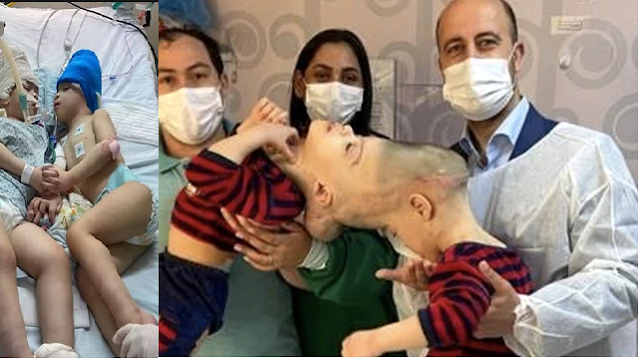Brazilian twins who shared fused brains at the head have successfully separated with the help of virtual reality.
Surgeons spent months trialing techniques
using virtual reality before beginning the real procedures on the
three-year-old Brazilian boys.
Bernardo and Arthur Lima underwent
several surgeries in Rio de Janeiro, under the direction of UK-based pediatric
surgeon Noor ul Owase Jeelani from London's Great Ormond Street Hospital.
The three-year-olds had
seven surgical procedures, involving more than 27 hours of operating time in
the final operation and almost 100 medical staff.
Their surgery was led
by Mr Jeelani, alongside Dr Gabriel Mufarrej, head of paediatric surgery at
Instituto Estadual do Cerebro Paulo Niemeyer.
It was one of the most
complex separation procedures ever conducted, according to the charity that
funded it- Mr. Jeelani founded in 2018 - Gemini Untwined.
Mr. Jeelani defined the
operation as a "remarkable achievement" by medics but added the
charity, Gemini Untwined, relies on public donations to keep its work going.
He said: "The
successful separation of Bernardo and Arthur is a remarkable achievement by the
team in Rio and a fantastic example of why the work of Gemini Untwined is so
valuable.
He said that previously
unsuccessful attempts to separate the boys meant their anatomy was complicated
by scar tissue, and he was "really apprehensive" about the risky
procedure.
Mr. Jeelani stated he
was "absolutely shattered" after the 27-hour operation, where he took
only four 15-minute breaks for food and water. But, it was
"wonderful" to see the family feeling "over the moon"
afterward.
"There were a lot
of tears and hugs," he said. "It was wonderful to be able to help
them on this journey."
He added that as with
all conjoined twins after separation, the boys' blood pressures and heart rates
were "through the roof" - until they were reunited four days later
and touched hands.
The charity has fast
become a "global repository for knowledge and experience" of
separation surgery and, hopes it will serve as a model for a "global
health service" providing expert care in other rare diseases.
"The idea behind
the charity was to create a global health service for super-rare cases to try
and improve results for these kids," he said.
"The model of what
we have done, I think, can and should be replicated for other super-rare
conditions."
Their work was funded
by Gemini Untwined, a charity founded by Mr. Jeelani to raise funds for
siblings born joined at the head - called craniopagus twins.
Since the twins are
almost four years old, they are also the oldest craniopagus twins with a fused
brain to have been separated.
Both twins are
recovering well in hospital and will be supported with six months of
rehabilitation, the charity has said.
According to Gemini
figures, one in 60,000 births results in conjoined twins, and only 5% of these
are craniopagus children.














0 Comments